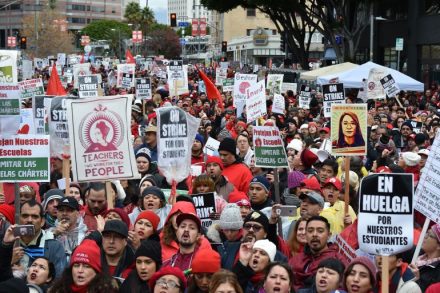Abortion rights, women of color, and LGBTQI+ people are under attack. Pledge to join us in fighting for gender justice.
LA Teachers Win for The Whole Community


After 6 days of picketing, Los Angeles teachers who had been on strike since January 14th have reached an agreement with the school district. Tens of thousands of teachers vowed to stay out on the picket line until the school district met their demands for smaller class sizes, increased support staff including nurses and guidance counselors, and a 6% pay raise. These teachers, the vast majority of whom are women, are fighting not only for their own job quality, but for justice for the entire community — and they won. In addition to winning a 6% pay raise, the agreement includes, among other things:
- Increased funding: including funding for 150 more full-time nurses, 41 more librarians and 17 new counselors.
- Decreased class sizes: reductions in class size through 2022 and a commitment to abide by contract terms regarding class size.
- Reductions in standardized testing: establishment of a committee which will develop a plan to reduce assessments by 50%.
- Lessening random searches: the extension to 28 schools of a pilot program that exempts schools from administering random student searches.
- Protections for immigrant families: establishment of a hotline and attorney for immigrant families.
These wins are historic. They are the result of teachers flexing their power as progressive level-setters – embraced by the support of students, parents, and the community at large. For the union, engaging community was intentional, not accidental. In L.A. County, a majority of k-12 students are Hispanic or Latino, and teachers are majority women of color, so linking economic justice to racial justice was paramount for broad support. As the UTLA President, Alex Caputo-Pearl told The Nation Magazine, “Fighting about class size and a full-time nurse in schools in a district that is overwhelmingly kids of color is a racial-justice issue. Period.” The tentative agreement reflects a deep commitment to bettering the lives of black and brown students who, among other injustices, are more likely to be targeted by random searches in schools as well as targeted by immigration authorities, and less likely to perform well on standardized tests.
And in a school district where approximately 500,000 of the 620,000 enrolled students receive free and reduced-price meals, ensuring that schools have nurses and guidance counselors is also critical for kids who may not have access to resources for private paid counselors or parents who can afford to take a day off from work to take them to the doctor.
The UTLA teacher actions may be the first big teacher strike actions of 2019, but they certainly won’t be the last. Just today, the Denver teachers union has voted to strike and the statistics in Denver mirror those in Los Angeles. In Denver, 55.5% of the students are Latino and 68% qualify for free or reduced lunch. The main issue on the table in Denver is a compensation system that leads to unpredictable wages and a 60% staff turnover from year to year – but the union recognizes this has an outsized effect on students who may be more dependent on school support systems for stability, including immigrant students whose parents may not be familiar with how the system works, or children from less well-off households who are more dependent on school resources day to day.
Starting with the 2012 Chicago Teachers Union strike, then sweeping through North Carolina, Colorado, Arizona, Oklahoma, Kentucky and West Virginia in 2018, teacher strikes which included demands for the community at large have become a powerful symbol of the ways in which unions can bargain for the common good – leading the charge for just communities for all – and underscoring the importance of strong public sector unions for the economic security of the community, and in particular for women and families.






